Politics
Germany: Far-right AfD stages day of chaos in parliament
Published
4 months agoon
By
Ekwutos BlogAlready classified as “extremist” by the domestic intelligence agency, the anti-immigrant populist party in Thuringia is now staging a prepared political scandal that bodes ill for democracy in Germany.
The eastern German state of Thuringia is far away from Berlin and its federal politics, so it’s not considered a major state in terms of political importance. With just 1.7 million people, it has less than half as many eligible voters as the German capital.
But it wasn’t always that way: The Weimar Republic, considered the first German democracy, was founded in the Thuringian city of Weimar. Culturally speaking, the state was also no lightweight: Martin Luther translated the New Testament into German here, Johann Wolfgang von Goethe and Friedrich Schiller made Weimar the center of German literature and philosophy, and the world-famous Bauhaus architecture was also founded in Thuringia.
Nazi-era slogans, extremists under surveillance
In 2024, however, the whole of Germany is looking at Thuringia with concern. For the first time since 1945 — the end of the most disastrous chapter in German history, the rule of Adolf Hitler and the National Socialists (Nazis) — a right-wing extremist party received the most votes in state elections here: the Alternative for Germany (AfD). On September 1, the party achieved a record 32.8 percent of the vote in state elections.
The results were anything but surprising. For months beforehand, constitutional lawyers, political scientists, local clubs, unions, business associations and churches warned of the consequences of an AfD election victory. In countless speeches and writings, top AfD officials have denigrated democratic institutions. Political competitors are insulted as “cartel parties” and German democracy is defamed as a “new dictatorship.” The AfD portrays the independent judiciary as the lackey of politics, has declared the destruction of competing parties as its goal, and is fighting for the deportation of millions of immigrants and people with international background.
And its top officials repeatedly flirt with the Nazi terror regime: A leading party member posed with his hand on his heart in front of Hitler’s bunker, an AfD politician relativized the crimes of the mass-murdering SS paramilitary, an AfD parliamentarian called himself “the friendly face of National Socialism,” a party official sent out Hitler pictures.
One of the AfD’s most influential politicians, Björn Höcke, serves as Thuringia’s AfD state chairman. Höcke has used the slogan of Hitler’s brownshirts SA division, “Everything for Germany!” to round off election campaign speeches. He has twice been found guilty of deliberately using the illegal slogans and sentenced at court to pay heavy fines as a result. The entire state branch of the AfD party has been classified by German domestic intelligence as “extremist,” and has been under surveillance since.
A landmark day in postwar German history
On Thursday, the freshly-elected state parliament convened in Thuringia’s capital, Erfurt – with the AfD as its strongest parliamentary group. The AfD thus served as the “master of ceremonies of democracy;” and because the oldest member of the state parliament is within the party’s ranks, it provided the parliament’s “chairperson by seniority.”
The first parliamentary session is packed with well-practiced democratic rituals: parliament convenes, establishes its quorum, and elects a parliamentary president so that parliamentary work can begin.
But before the procedures began, 73-year-old AfD chairman-by-seniority, Jürgen Treutler, delivered a speech in which he spoke of the “contempt of the people” by an “elite.” And he favorably quoted the nationalist and antisemitic educator Eduard Spranger as one of the “more important German thinkers.” Spranger ensured that Jews were excluded from the Goethe Society literary group in 1938, and defended the development of Nazi society under Hitler. After Treutler finished his scripted speech, a spectacle that constitutional experts had forewarned of began: the AfD attempted to take control of the parliament’s rules of procedure, using its chairman-by-seniority to paralyze parliament during the next step: electing the parliament president.
In Germany, the office of state parliament president is traditionally given to the strongest parliamentary group; the office is not considered important, and the rules to elect the president are somewhat open to interpretation. However, the person who holds that position controls all parliamentary procedures. They can also assign important staff positions in the parliamentary administration. So, the AfD, classified by German domestic intelligence as “definitely right-wing extremist,” wanted to appoint the president, because it is the strongest parliamentary group. Despite a strong state election result, the AfD is not even close to having a parliamentary majority. All other parliamentary parties thus tried to hinder the election of parliament president. The AfD, in turn, then tried to block their effort.

Parliamentary leaders repeatedly held consultations during the chaotic scenes of the opening day of session
© Martin Schutt/dpa/picture alliance
In addition, at this point in the process, a new parliament does not yet have a quorum, leading to scenes of chaos and drama.
From the start of the session, the new chairman-by-seniority refused motions from the other parties. The mood immediately flared. The CDU called it a “power grab” because the “sacred right” of MPs to organize themselves was being denied, and because the AfD – a minority party – was sabotaging the majority opinion in parliament.
The session saw repeated interruptions and hours-long discussions between the parliamentary group leaders at the chairman’s desk. How to proceed? 73-year-old Treutler clung to his speech manuscript. He mostly seemed not to be listening while the director of Parliament, Jörg Hopfe, explained the legal intricacies to the parliamentarians.
While the AfD chairman continued to read from his manuscript, the parliament director interrupted him several times. The director, Hopfe, is a lawyer, a renowned expert on Thuringian parliamentary and constitutional law, and a 33-year veteran of parliamentary administration. He approached the chairman’s podium repeatedly, pointing out alleged procedural errors. When the AfD politician shouted: “Don’t interrupt me!” Hopfe replied: “That’s a breach of the constitution!” Treutler continued unperturbed. It all amounted to an unprecedented procedure.

Legal expert Jörg Hopfe tried several times to explain to AfD’s Jürgen Treutler the parliamentary procedures, but was repeatedly dismissed
© Bodo Schackow/dpa/picture alliance
Renewed calls for ban of AfD
After hours of skirmishes and interruptions, the first plenary day ended with no result. Now the Thuringian Constitutional Court will have to decide how to proceed. That first session seemed to confirm what the AfD has insisted, albeit for different reasons: the democratic establishment cannot work constructively.
Although the Thuringian constitutional judges have not yet made their ruling, numerous legal experts believe the chairman and AfD politician far exceeded his authority and acted inappropriately.
At the conclusion of that chaotic first parliamentary session, the acting Thuringian Interior Minister, Social Democrat Georg Maier, spoke out on the platform X, formerly Twitter. He once again called for Germany to ban the AfD outright: “Today’s events in the Thuringian state parliament have shown that the AfD is aggressively combating parliamentarianism. I think that the prerequisites for a ban procedure have been met.”
You may like


LAND OWNERSHIP IN NIGERIA: SETTING THE RECORD STRAIGHT- Hon Success Opara


Renowned Comedian Alibaba’s Spouse Shares Enchanting Snap of Their Trio of Bundles of Joy to Commemorate Their First Year of Life


Victor Osimhen Responds to Allegations of Assaulting Turkish Journalist
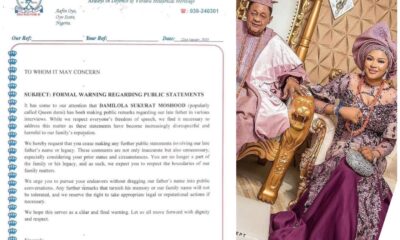

Stop dragging our father’s name into public conversations- late Alaafin of Oyo’s children threaten legal action against Queen Dami
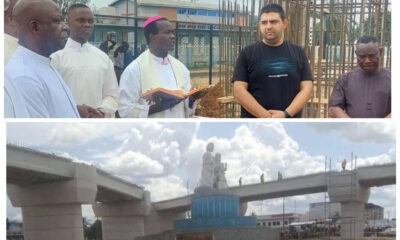

ASSUMPTA FLYOVER: CAN URGES RELIGIOUS AND COPORATE BODIES TO COOPERATE WITH IMO GOVT
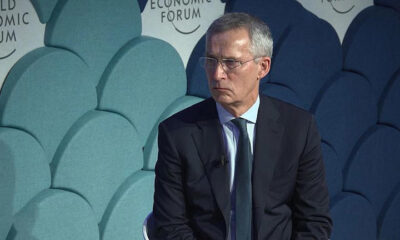

Ending Russia’s war in Ukraine this year is possible, says ex-NATO chief Stoltenberg
Politics
‘Playing with fire’: Orbán’s sanctions veto threat puts Brussels on edge
Published
6 hours agoon
January 24, 2025By
Ekwutos Blog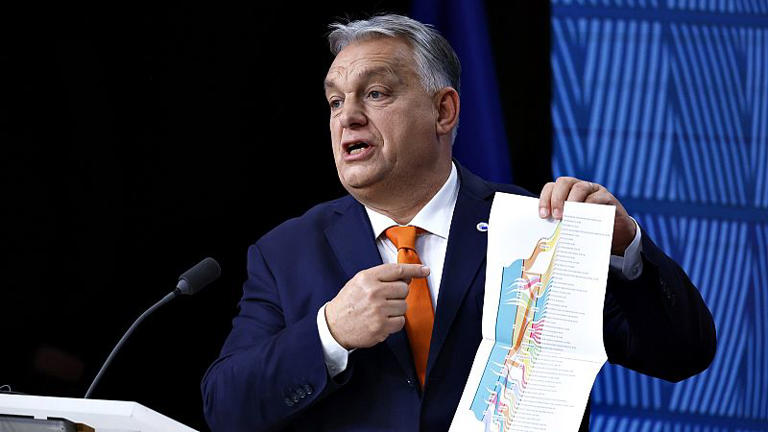
Diplomats and officials in Brussels are holding their breath as they wait to find out if Viktor Orbán’s increasingly critical rhetoric against EU sanctions will translate into a veto that could upend the bloc’s Russia policy, as soon as next week.
Since February 2022, the bloc has brought in sweeping bans on trade with Russia in energy, technology, finance, luxury goods, transport and broadcasting, among others. It’s also frozen €210 billion assets held by the Russian central bank within the bloc, which have been used to back a multi-billion-euro loan for Kyiv.
Those could all soon be put into question. The restrictions, designed to cripple Moscow’s ability to finance its full-scale invasion of Ukraine, need to be prolonged every six months by unanimity, and the next deadline is 31 January.
In recent days, Orbán and his deputies have ratcheted up their harsh words against the sanctions regime, arguing the inauguration of US President Donald Trump, who wants to negotiate with Russia’s Vladimir Putin, requires the bloc to rethink its longstanding stance.
“The question of extending the sanctions is now on the agenda, and I pulled the handbrake and asked European leaders to understand that this cannot be continued,” the Hungarian Prime Minister said in a radio interview on Friday morning.
One of his ministers, Gergely Gulyás, has openly questioned the six-monthly renewal. “So far, everyone has seen the extension of sanctions as automatic, but we do not think it is automatic now,” Gulyás said on Thursday.
Those comments have stoked fears that Hungary will use its veto to block the rollover, triggering the collapse of a sanctions regime painstakingly built across 15 packages, and depriving the EU of its most hard-hitting tool against the Kremlin.
“It’s clear that if Budapest were to block, we would have a great issue at hand,” said a senior diplomat, who spoke on condition of anonymity due to the sensitivity of the matter. “Budapest is playing with fire.”
The diplomat described the political situation as “mind-blowing” given the dire battleground conditions faced by Ukrainian forces, and predicted the EU would plunge into “uncharted territory” were sectoral sanctions to collapse overnight.
“The shenanigans we get from Budapest are seemingly endless,” the diplomat said.
A closed-door discussion among ambassadors on Friday only increased the uncertainty, as the Hungarian representative maintained ambiguity over his position, several diplomats said.
Instead, Hungary asked to change the agenda of Monday’s meeting of foreign affairs ministers, to allow the item on sanctions renewal, which is generally approved without any fuss, to be openly debated after a separate discussion on Ukraine support.
The Hungarian envoy also made a number of requests concerning energy policy, and in particular Ukraine’s recent decision to terminate the transit of Russian gas through Hungary, another diplomat said.
The decision, taken by President Volodymyr Zelenskyy to stop Moscow from earning “additional billions on our blood,” has met with a furious reaction from Hungary and Slovakia, two landlocked countries that still purchase Russian fossil fuels. Earlier this month, Slovak Prime Minister Robert Fico threatened to use his veto power in retaliation.
‘Transactional’ diplomacy
In his radio interview, Orbán made a direct link between sanctions renewal and the gas dispute, and asked the European Commission to intervene in his country’s favour.
The Commission has said it has “no interest” in extending the transit of Russian gas.
“What is closed now, has to be reopened again. This is not a matter for Ukraine, it is an issue for Europe, an issue for central Europe,” the prime minister said.
“If the Ukrainians want help, for example sanctioning the Russians, then let’s reopen the gas transit routes and allow the central European countries, including Hungary, to receive the gas we need through Ukraine.”
The connection between the two issues has left diplomats scratching their heads, trying to figure out how severe the latest threat actually is. Orbán has previously used his veto to extract concessions, but never to provoke such a disruptive effect on sanctions.
“The threats are taken seriously. But it’s not the first time,” a diplomat said, decrying Hungary’s “transactional” manner of making demands.
“The EU cannot enter into panic mode every time somebody says something in Budapest,” they added. “We have learned to make a clear distinction between what we hear in Budapest and what happens in Brussels.”
The suspense is likely to last, at least, until foreign affairs ministers meet on Monday and Hungary’s representative, Péter Szijjártó, announces his country’s position. Diplomats speculate that, despite the harsh talk, Szijjártó will back down if he can secure new EU assistance for Hungary’s energy needs.
This will pave the way for the renewal to be approved, if not on Monday, then at least before the end of the month.
“We expect a positive result from that discussion. [Sanctions] are a key part of our strategy,” said a high-ranking EU official. The issue of gas transit has “nothing to do with sanctions on Russia. Sanctions on Russia are because of the aggression.”
Asked if Brussels was already drafting a Plan B, the official said: “We don’t envisage any other possibility than that it will be approved in the coming days.”
One factor certain to influence the discussion are the latest comments made by Donald Trump, who took some observers by surprise with hawkish comments against Russia.
“If we don’t make a deal, and soon, I have no other choice but to put high levels of taxes, tariffs, and sanctions on anything being sold by Russia to the United States, and various other participating countries,” Trump said.
“We can do it the easy way, or the hard way – and the easy way is always better.”
The EU is already preparing a 16th package of sanctions against Russia, with the view to approving them before the third anniversary of the invasion, in late February.
Politics
Donald Trump To Reduce Oil Prices Worldwide
Published
8 hours agoon
January 24, 2025By
Ekwutos Blog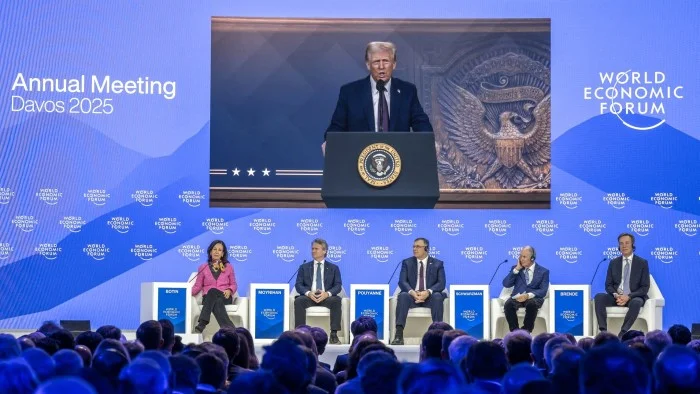
Donald Trump has reportedly urged Opec and Saudi Arabia to lower global oil prices and called for central banks worldwide to reduce interest rates immediately after.
Speaking to business leaders in Davos on Thursday, the former US president criticized oil producers for not acting sooner to reduce crude oil costs.
“I’m going to ask Saudi Arabia and Opec to bring down the cost of oil. You gotta bring it down. Frankly, I’m surprised they didn’t do it before the election,”Trump said.
He suggested that lowering oil prices could help stop Russia’s war in Ukraine, saying,
“Right now, the price is high enough that the war will continue. Bring it down, and you could end that war.”
Trump also encouraged global companies to manufacture their products in the US, warning them of heavy tariffs if they import goods into the American market.
He promoted his economic policies, including large tax cuts and reduced regulations, describing them as a “revolution of common sense.”
This is an ongoing story.
Politics
President Bola Ahmed Tinubu has appointed board chairpersons for 42 federal organisations and a secretary to the board of the Civil Defence, Immigration, and Prisons Services.
Published
11 hours agoon
January 24, 2025By
Ekwutos Blog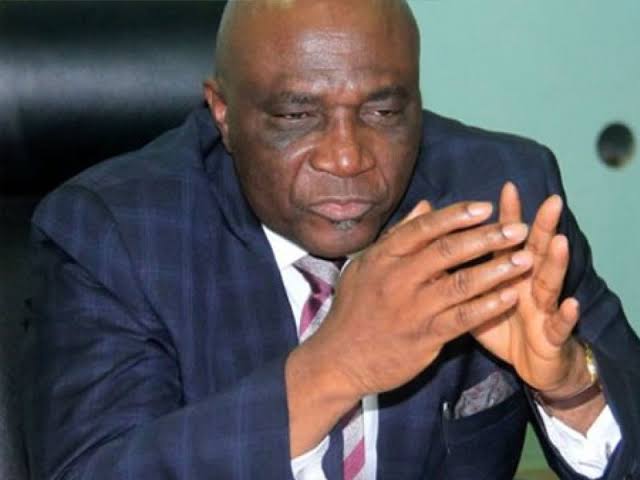
STATE HOUSE PRESS RELEASE
APPOINTMENT OF BOARD CHAIRPERSONS AND CEOS
President Bola Ahmed Tinubu has appointed board chairpersons for 42 federal organisations and a secretary to the board of the Civil Defence, Immigration, and Prisons Services.
The President has also appointed a new managing director for the Nigerian Railway Corporation and a director-general for the National Board for Technology Incubation (NBTI).
President Tinubu directs the board chairpersons not to interfere with the management of the organisations, emphasising that their positions are non-executive.
All the appointments take immediate effect.
1. NATIONAL YOUTH SERVICE CORPS, MINISTRY OF YOUTH DEVELOPMENT
– Hon. Hillard Eta Chairman (Cross River)
2. NIGERIAN INSTITUTE OF INTERNATIONAL AFFAIRS
– Prof. Bolaji Akinyemi, Chairman (Lagos)
3. FEDERAL AIRPORT AUTHORITY OF NIGERIA, MINISTRY OF AVIATION
– H. E. Abdullahi U. Ganduje, Chairman (Kano)
4. NATIONAL SUGAR DEVELOPMENT COUNCIL
– Sen. Surajudeen Bashiru Ajibola, Chairman (Osun)
5. NIGERIA BULK ELECTRICITY TRADING COMPANY
– H. E. Sulaiman Argungu, Chairman (Kebbi)
6. NATIONAL AGENCY FOR GREAT GREEN WALL
– Sen. Magnus Abe, Chairman (Rivers)
7. NATIONAL TEACHERS INSTITUTE
– Barr. Festus Fuanter, Chairman (Plateau)
8. NATIONAL BOARD FOR TECHNOLOGY INCUBATION (NBTI)
– Raji, Kazeem Kolawole, Director-General (Oyo)
9. NIGERIAN INSTITUTE OF EDUCATIONAL PLANNING AND ADMINISTRATION
– Chief Victor Tombari Giadom, Chairman (Rivers)
10. TEACHERS REGISTRATION COUNCIL OF NIGERIA
– Comrade Mustapha Salihu, Chairman (Adamawa)
11. INDUSTRIAL TRAINING FUND
– Hon. Hamma Adama Ali Kumo, Chairman (Gombe)
12. NIGERIAN INSTITUTE OF SCIENCE LABORATORY TECHNOLOGY
– Donatus Enyinnah Nwankpa, Chairman (Abia)
13. SHEDA SCIENCE AND TECHNOLOGY COMPLEX
– Sen. Abubakar Maikafi, Chairman (Bauchi)
14. FEDERAL MORTGAGE BANK OF NIGERIA
– H. E. Nasiru Gawuna, Chairman (Kano)
15. NATIONAL OFFICE FOR TECHNOLOGY ACQUISITION AND PROMOTION
– Sen. Tokunbo Afikuyomi, Chairman (Lagos)
16. NIGERIAN POSTAL SERVICE
– Chief D. J. Kekemeke, Chairman (Ondo)
17. NATIONAL INLAND WATERWAYS AUTHORITY
– Hon. Musa Sarkin Adar, Chairman (Sokoto)
18. NATIONAL STEEL COUNCIL
– Prof. Abdulkarim Kana Abubakar, Chairman (Nasarawa)
19. NATIONAL ENVIRONMENTAL STANDARDS AND REGULATIONS
ENFORCEMENT AGENCY
– Hon. Garba Datti Muhammad, Chairman (Kaduna)
20. NATIONAL BIO-SAFETY MANAGEMENT AGENCY
– Mu’azu Bawa Rijau, Chairman (Niger)
21. NIGERIAN BUILDING AND ROAD RESEARCH INSTITUTE
– Hon. Durosimi Meseko, Chairman (Kogi)
22. FEDERAL TEACHING HOSPITAL, GOMBE
– Hajia Zainab A. Ibrahim, Chairman (Taraba)
23. NIGERIAN RAILWAY CORPORATION
– Dr.Kayode Isiak Opeifa, Managing Director (Lagos)
24. FEDERAL TEACHING HOSPITAL, IDO-EKITI
– Aare (Hon.) Durotolu Oyebode Bankole, Chairman (Ogun)
25. FEDERAL MEDICAL CENTRE, ABEOKUTA
– Mr Abdullahi Dayo Israel, Chairman (Lagos)
26. FEDERAL MEDICAL CENTRE, ASABA
– Dr. Mrs. Mary Alile Idele, Chairman (Edo)
27. FEDERAL MEDICAL CENTRE, LOKOJA
– Nze Chidi Duru (OON), Chairman (Anambra)
28. FEDERAL MEDICAL CENTRE, OWERRI
– Hon. Emma Eneukwu, Chairman (Enugu)
29. CIVIL DEFENCE, IMMIGRATION AND PRISONS SERVICES BOARD
– Major Gen. Jubril Abdulmalik Rtd, Secretary (Kano)
30. FEDERAL MEDICAL CENTRE, UMUAHIA
– Mr. Uguru Mathew Ofoke, Chairman (Ebonyi)
31. FEDERAL MEDICAL CENTRE, YENAGOA
– Barr. Felix Chukwumenoye Morka, Chairman (Delta)
32. FEDERAL MEDICAL CENTRE, YOLA
– Alh. Bashir Usman Gumel, Chairman (Jigawa)
33. DAVID UMAHI FEDERAL UNIVERSITY TEACHING HOSPITAL, UBUHU, EBONYI STATE
– Dr. Ijeoma Arodiogbu, Chairman (Imo)
34. NATIONAL OIL SPILL DETECTION AND RESPONSE AGENCY
– Chief Edward Omo-Erewa, Chairman (Edo)
35. NIGERIAN MARITIME ADMINISTRATION AND SAFETY AGENCY (NIMASA)
– Yusuf Hamisu Abubakar, Chairman (Kaduna)
36. NNAMDI AZIKIWE UNIVERSITY TEACHING HOSPITAL, NNEWI, ANAMBRA STATE
– Hon. Ali Bukar Dalori, Chairman (Borno)
37. AHMADU BELLO UNIVERSITY TEACHING HOSPITAL, SHIKA, ZARIA,
KADUNA STATE
– Hon. Lawal M. Liman (Chairman)
38. FEDERAL MEDICAL CENTRE KATSINA
– Dr. Abubakar Isa Maiha (Chairman)
39. RAW MATERIALS RESEARCH AND DEVELOPMENT COUNCIL (RMRDC)
– Isa Sadiq Achida, Chairman (Sokoto)
40. FEDERAL MEDICAL CENTRE BIRNIN KUDU
– Dr. Mohammed Gusau Hassan, Chairman Zamfara
41. NATIONAL BUILDING AND ROAD RESEARCH INSTITUTE
– Hon. Yahuza Ado Inuwa, Chairman (Nasarawa)
42. SOKOTO-RIMA RIVER BASIN DEVELOPMENT AUTHORITY
– Amb. Abubakar Shehu Wurno, Chairman (Sokoto)
43. AMINU KANO TEACHING HOSPITAL
– Augustine Chukwu Umahi, Chairman (Ebonyi)
44. FEDERAL SCHOLARSHIP BOARD
– Engr. Babatunde Fakoyede, Chairman (Ekiti)
45. NIGERIAN SOCIAL INSURANCE TRUST FUND
– Hon. Shola Olofin, Chairman (Ekiti)
Bayo Onanuga
Special Adviser to the President
(Information & Strategy)
January 23, 2025

LAND OWNERSHIP IN NIGERIA: SETTING THE RECORD STRAIGHT- Hon Success Opara

Renowned Comedian Alibaba’s Spouse Shares Enchanting Snap of Their Trio of Bundles of Joy to Commemorate Their First Year of Life

Victor Osimhen Responds to Allegations of Assaulting Turkish Journalist
Trending
- Politics11 months ago
Nigerian Senate passes Bill seeking the establishment of the South East Development Commission.

 Business11 months ago
Business11 months agoInflation hits record high of 29.90% on naira weakness

 Politics8 months ago
Politics8 months agoBREAKING: Federal Gov’t Offers To Pay Above N60,000, Reaches Agreement With Labour

 SportsNews11 months ago
SportsNews11 months agoOlympic Qualifiers 2024: CAF Confirms Dates For Super Falcons Vs Banyana Banyana

 Trending3 months ago
Trending3 months agoNYA demands release of ‘abducted’ Imo chairman, preaches good governance
- Business3 months ago
US court acquits Air Peace boss, slams Mayfield $4000 fine

 Politics3 months ago
Politics3 months agoMexico’s new president causes concern just weeks before the US elections
- Entertainment3 months ago
Bobrisky transferred from Immigration to FCID, spends night behind bars

